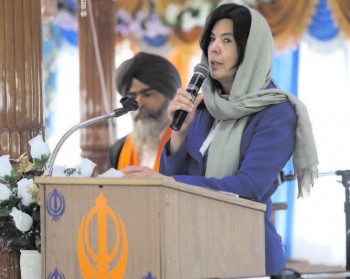
CHICAGO (TIP): A recent video showing classmates taunting a Sikh student on a Georgia school bus – one of them calling the student a “terrorist” – and the 2012 shooting at a Sikh temple in Wisconsin that left six dead have highlighted the problem of hate crimes against the Sikh community.
On Sunday, March 22, Cook County State’s Attorney Anita Alvarez reached out to address the problem by visiting the Sikh Religious Society of Chicago in Palatine.
Before the congregation assembled at the society’s Gurdwara Sahib (Sikh place of worship), Alvarez told members she will seek the community’s input for her recently formed Hate Crimes Advisory and Prosecution Council.
“I also understand that the issue of hate crimes is a significant concern to your community and I want to emphasize my commitment to combating this issue as your state’s attorney,” she said.
Alvarez announced that she has named one of her assistant state’s attorneys, a member of the Sikh community, to the council. Amrith Aakre, who handles the office’s diversion programs and trains law enforcement about the Sikh community, is familiar with the Gurdwara Sahib, having attended the temple while growing up in West suburban Wayne.
Alvarez has also named Aakre’s father, Rajinder Singh Mago, who handles community outreach and public relations for the society, to her Asian American Advisory Council.
She said the chief focus on the Hate Crimes Council will be creating and maintaining proactive partnerships with communities typically targeted in hate crimes.
“My goal is to reinvigorate our efforts, not only in prosecuting hate crimes when we become aware of them, but also in bringing together important voices to develop a community-based plan that works to raise awareness about hate crimes and also strives to prevent them,” she added.
Sikhism is the fifth largest religion in the world, with 23 million followers. For comparison, Judaism is the sixth largest, with 15 million.
Aakre said Sikhs promote equality and, at its founding, was committed to abolishing the Indian caste system. One of the marks of the faith is the wearing of the turban, which has become a target for religious intolerance.
“There has been a significant amount of negative media post 9/11, and there is still that perception that many turban wearing individuals in the U.S. are Muslims, Middle Easterners somehow connected to terrorism,” Aakre said. “We know that none of these things are true, but that misperception has led to the significant number of incidents and the rise of hate crimes and bullying within in the United States.”
Statistics from the Sikh Coalition show that more than two-thirds of Sikh students are victims of bullying, she said.
Aakre’s brother, Satnaam Singh Mago, spoke of his own experiences as a child being bullied and the conflicts he faced growing up.
“You go to school and you want to be American. You’re at home (and) there is so much pressure. You’re trying to be Indian. You’re trying to balance two lives,” he said.
“The suicide rate is actually comparable in the Sikh community (to) the gay community,” he added. “The misinformation that comes with the turban, with the Sikh community and all that is costing us – our boys, our girls -so much in our community. These stakes really are high for us.”





Be the first to comment